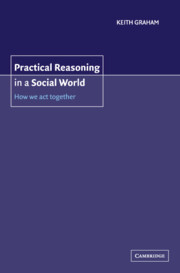Book contents
- Frontmatter
- Contents
- Preface
- Acknowledgements
- Introduction
- 1 Practical reasoning in context
- 2 The indistinctness of persons: causal interconnection
- 3 The indistinctness of persons: the personhood of collectivities
- 4 Practical collective identification and dissociation
- 5 Practical reasoning: sources and constraints
- 6 Practical reasoning and morality
- Conclusion
- Bibliography
- Index
1 - Practical reasoning in context
Published online by Cambridge University Press: 22 September 2009
- Frontmatter
- Contents
- Preface
- Acknowledgements
- Introduction
- 1 Practical reasoning in context
- 2 The indistinctness of persons: causal interconnection
- 3 The indistinctness of persons: the personhood of collectivities
- 4 Practical collective identification and dissociation
- 5 Practical reasoning: sources and constraints
- 6 Practical reasoning and morality
- Conclusion
- Bibliography
- Index
Summary
Human beings, we can be sure, have always disagreed about what there is reason to do. But the nature of the disagreements, and the views that we can form about how to deal with them, will vary with context. In this chapter I outline the broad modern context of practical disagreement, survey some of the strategies available for dealing with it, and locate my own project in relation to them. This is necessary for establishing what I shall assume as much as what I shall argue for. It also enables me to begin the examination of the doctrine of the distinctness of persons and to indicate the problems connected with it.
THE MODERN CONTEXT
It is commonly observed that the disenchantment of the modern world has rendered it a place of hard realities, investigable by the methods of modern science, and at the same time divested it of values. Many people no longer believe that we can simply infer our values from some set of premises about the natural order and our place in it, because they no longer believe that brute nature has the teleological character which would be necessary for that process of inference even to be possible. That problem is exacerbated because the loss of belief in a purposive natural order is often accompanied by the lack of belief in a purposive social order.
- Type
- Chapter
- Information
- Practical Reasoning in a Social WorldHow We Act Together, pp. 11 - 37Publisher: Cambridge University PressPrint publication year: 2002

